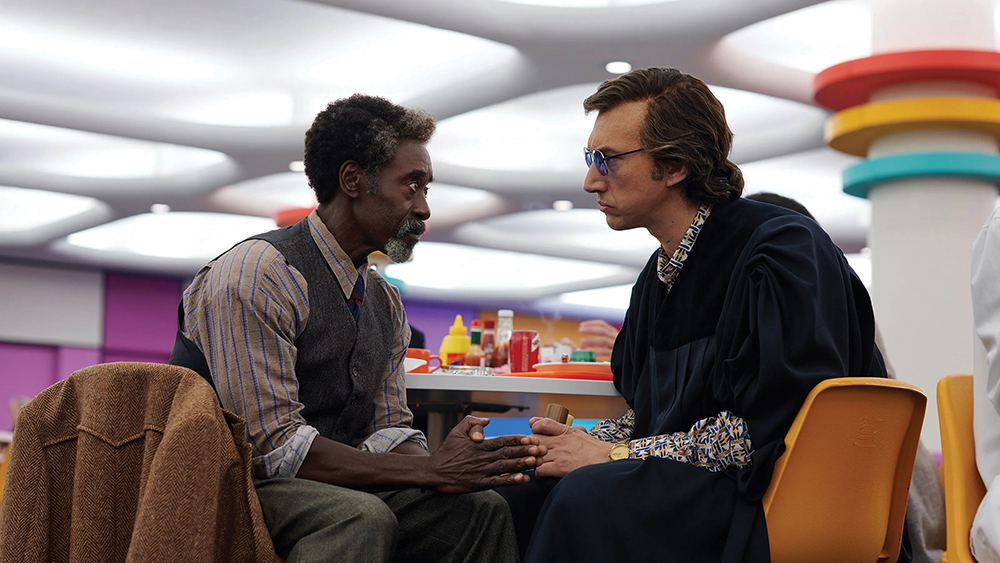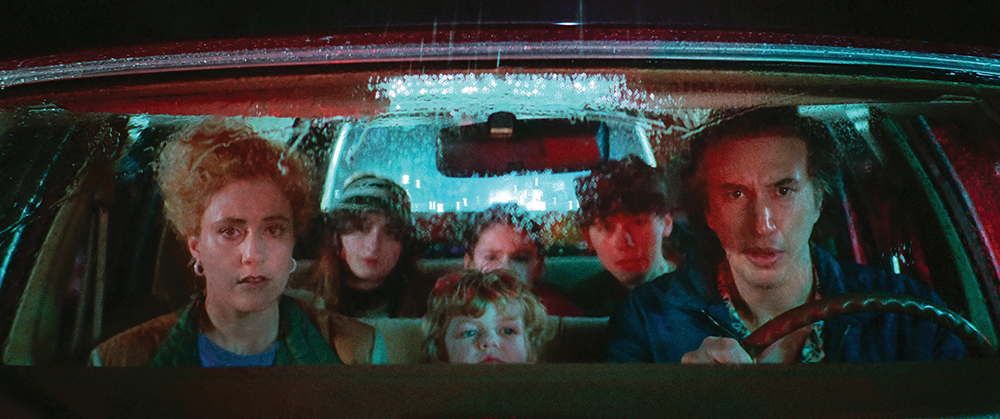In 1985, when Don DeLillo wrote his acclaimed novel White Noise, it was considered an absurdist comedy. When you’re watching Noah Baumbach’s 2022 film adaptation of White Noise, you will have moments of startling deja vu. What was considered over-the-top crazy in 1985 is now just stuff that happens in everyday life.
DeLillo’s “hero,” if you want to call him that, is Jack Gladney (Adam Driver), a prominent professor of “Hitler Studies” at a Midwestern liberal arts college. Both he and his wife Babette (Greta Gerwig) are on their fourth marriages, so their four children live in an extremely mixed family. Luckily, the kids seem to get along well, bonded by their shared love of televised disasters. Plane crashes, floods, fires — the deadlier the better, says this household of typical viewers.
But disasters are only fun to watch at a safe remove. When they’re actually happening to you, it’s a different story. A few miles from the Gladney residence, a drunken trucker accidentally rams his tanker into a train full of chemicals. At first, Jack doesn’t believe the “airborne toxic event” is going to be a problem. Desperate evacuations to grubby refugee camps is something that happens to people in Haiti, not affluent Midwesterners. Even the frantic call from a National Guard truck to “evacuate immediately!” is an annoyance because it comes in the middle of dinner.

For those of us who just lived through the pandemic, the Airborne Toxic Event feels like prophecy. The authorities can’t even agree on what to call it at first, and the name they settle on is comically ambiguous. The ever-changing signs of exposure to the toxic cloud include vague things like “unexplained deja vu” — when Steffie (May Nivola) experiences tingling in her extremities, Heinrich (Sam Nivola) accuses her of experiencing “outdated symptoms.” Even the anticlimactic end of the event seems familiar. One day, everyone is just allowed back to their homes, and not much else is said about the whole affair.
For his 11th film, Baumbach has taken on an extremely high degree of difficulty in adapting a beloved, but prickly, literary masterpiece. He leans heavily on Driver, who delivers with his usual intensity. You might not think “team teaching a college class on the parallels between Hitler and Elvis” sounds like good fodder for a cinematic experience, but Driver and Don Cheadle, who plays Jack’s frenemy professor Murray, make it riveting.
Gerwig and Baumbach are a couple, and judging from Lady Bird and Little Women, she is every bit his equal as a director. (Her $100 million Barbie movie drops next summer.) Babette gets pushed aside, in favor of Jack’s comically exaggerated narcissism. During her big scene, in which she confesses her drug addiction and affair, a stunned Jack can only repeat, “This is not Babette’s purpose.” DeLillo intended Jack to be an affectionate parody of the many “white guys who teach college” protagonists of literary novelists like Raymond Carver and John Irving. But after the Trump era, his unexamined selfishness seems uglier, and less funny.
Even though Jack and Babette’s lives continue to become more surreal and more complex, the film never really matches the energy of the A.T.E. I often quote the Hitchcock adage that mediocre books make the best movies. Works of literary genius that depend on wordsmithery usually get lost in translation. (Paul Thomas Anderson’s Inherent Vice is the exception that proves the rule.) Baumbach’s White Noise is dense and wordy. He creates some unlikely thrilling moments. I’m not sure what it all means, or if it holds together, but I do know that I’m still thinking about it, and I want to watch it again.
White Noise
Now playing
Multiple locations
